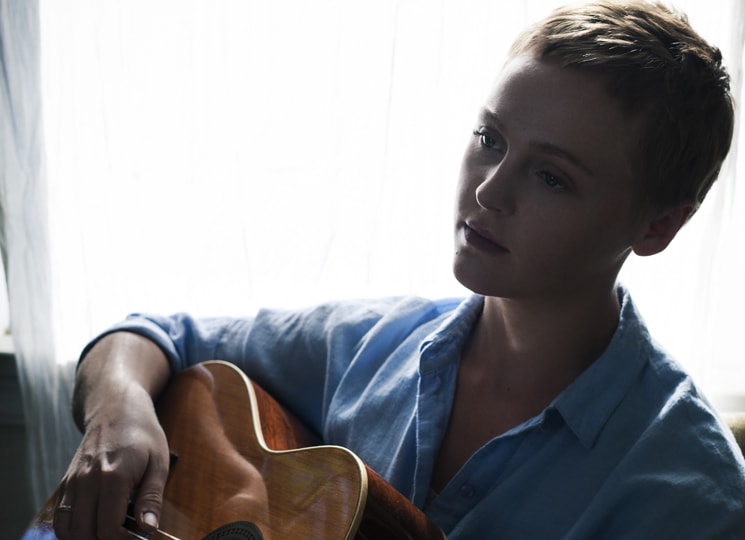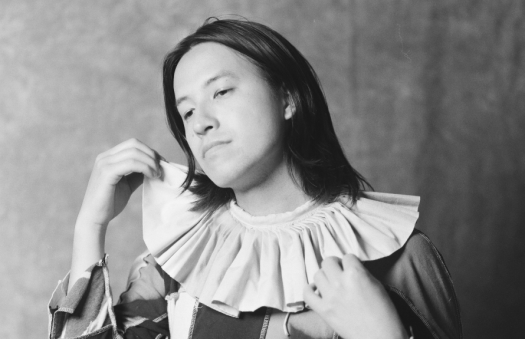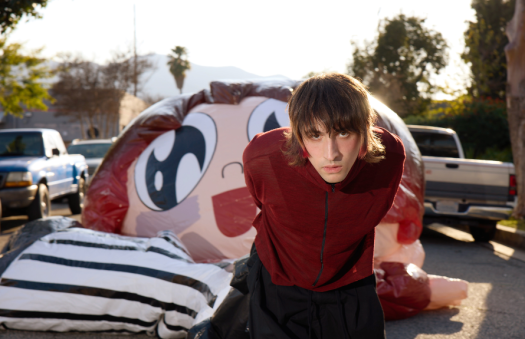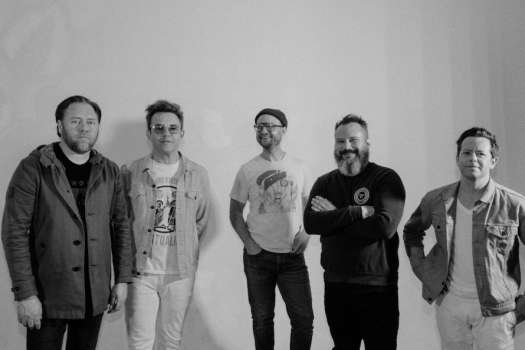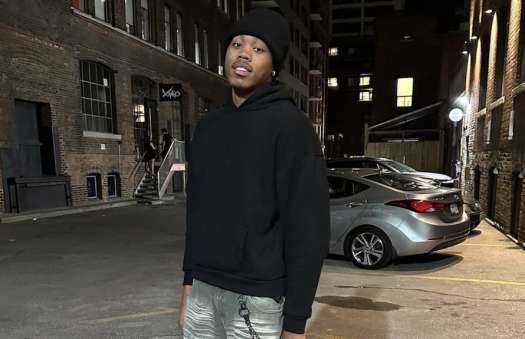There's something intriguingly incongruous about a British folk singer in Los Angeles. Yet that is precisely where Laura Marling, Brit Award-winning darling of the UK folk revival, recently set up shop for two-and-a-half years. She left in December 2014 — without packing anything. Exclaim! caught up with her juggling press for her vibrant, crisp, rock-oriented fifth album, Short Movie (which drops March 24 on Ribbon Music), amidst closing up her place in L.A. and preparing to ship her things home to England.
"I missed the rain," she says softly, by way of explanation. "The only people I knew when I got here were session musicians and a couple producers. They were my musical community and they are all unbelievable musicians. So I thought I had to up my game a bit if I was going to be invited to the goings-on. For the first time since I learnt the guitar when I was a child I started properly practising, I was jamming — which I had never done, because jamming is a very un-English pastime."
Coming from the tiny UK village of Eversley, Hampshire, L.A. must have felt jarring. "The landscape of California, the expanse of it, changed my idea of my place in the world," Marling says, "which would have had an effect on the way I write stories, I guess. Los Angeles feels like this never-ending city. I don't know how I managed to avoid this so far in my life, but I suddenly became aware of how densely overpopulated the planet was and became quite morbid about that. It put me in perspective a bit."
Short Movie is actually Marling's second attempt to follow up 2013's acclaimed, Mercury Prize-nominated Once I Was an Eagle. Marling and her band went into the studio in late 2013 and recorded an album that never saw the light of day. "It was like the second half of Once I Was an Eagle," Marling explains. "It was sort of like a boring afterthought.
"I had been stubbornly trying to pursue it, because I couldn't face the idea of having to wait another eight months to record. But I had to. I was just trying to maintain a structure to my life when what I really needed was to have a small breakdown."
The weirdest thing about being a musician, according to Marling, is what do you do all day? "Just wait for a song to come?" she laughs in real, remembered frustration. "I was trying to fill my time with other things: I applied to do courses; I travelled a bit, but it was completely chaotic and real drudgery — I [had] a service job for a bit, but I'd never done that before so I was bad at it and it didn't last very long."
Thankfully, Marling's writing break was brief. Critics seem to say this every time she puts a record out, but Short Movie may be her best. It's certainly her boldest, most rocking, and freest, as well as her least archetypical and most-rooted in landscape and experience.
Self-produced in London (Marling worked with her drummer, Matt Ingram and engineer Dan Cox), Short Movie aurally falls somewhere in the mid-Atlantic; Marling's vocal delivery and her father's Gibson 335 (her main instrument in Los Angeles) are very American rock poet, yet something nautical and English remains in her urgent strumming and string arrangements.
Of the West Coast places referenced in the new songs — among them Santa Cruz and Joshua Tree National Park — Marling calls them "pinpoints in my psyche." "When I was visiting those places I was in such a transcendental state," she says. "They became places associated with [certain] revelations, with my understanding of what's going on.
"I was travelling on my own for six months and I kind of felt like I was outside of society and structure," she explains. "I felt dissociated from myself in a weird way; I had a break in the relationship between my impersonal and personal self, which I see now as an ego breakdown or something. But I only put that together in retrospect."
Marling, who attended a Quaker school growing up, clearly thinks about these things. Uber-poppy reverb-drenched "Gurdjieff's Daughter" is about the "far-out" meeting between '60s film director Alejandro Jodorowsky and Reyna D'Assia, daughter of spiritual teacher G.I. Gurdjieff (Marling has since read some of Gurdjieff's writings).
Though Marling doesn't consider herself religious ("I am absolutely opposed to religion," she says) and is similarly uncomfortable with the word "spirituality," Quaker ideas and values permeate songs like "Divine." "Quakers would say, 'there's the light of God in everybody,' which I wouldn't agree with the wording," says Marling, "but it's a nice sentiment: that you are exactly the same as everyone else."
The intrepid, Airbnb-loving songwriter isn't sure exactly where she's going to land once she's back in England after touring. "I don't know where I'm going to live, but I kind of get off on that," she says. But already, Marling is contextualizing her American hiatus and settling back in to her community of family and friends.
"At the time I felt like I might never make sense of it and it just might be the beginning of the end or something. I got dark," she says. "But now I look back on it and it was not a very long amount of time really.
"Now I've moved back to London and suddenly I have all of these friends and family and a few people I know really well. When I got back to them, it just gave me foundation again. I sort of grounded myself and pulled myself back down from space."
Marling recently announced a North American summer tour, including dates in Montreal (July 27) and Toronto (July 28). You can see all those dates here.
"I missed the rain," she says softly, by way of explanation. "The only people I knew when I got here were session musicians and a couple producers. They were my musical community and they are all unbelievable musicians. So I thought I had to up my game a bit if I was going to be invited to the goings-on. For the first time since I learnt the guitar when I was a child I started properly practising, I was jamming — which I had never done, because jamming is a very un-English pastime."
Coming from the tiny UK village of Eversley, Hampshire, L.A. must have felt jarring. "The landscape of California, the expanse of it, changed my idea of my place in the world," Marling says, "which would have had an effect on the way I write stories, I guess. Los Angeles feels like this never-ending city. I don't know how I managed to avoid this so far in my life, but I suddenly became aware of how densely overpopulated the planet was and became quite morbid about that. It put me in perspective a bit."
Short Movie is actually Marling's second attempt to follow up 2013's acclaimed, Mercury Prize-nominated Once I Was an Eagle. Marling and her band went into the studio in late 2013 and recorded an album that never saw the light of day. "It was like the second half of Once I Was an Eagle," Marling explains. "It was sort of like a boring afterthought.
"I had been stubbornly trying to pursue it, because I couldn't face the idea of having to wait another eight months to record. But I had to. I was just trying to maintain a structure to my life when what I really needed was to have a small breakdown."
The weirdest thing about being a musician, according to Marling, is what do you do all day? "Just wait for a song to come?" she laughs in real, remembered frustration. "I was trying to fill my time with other things: I applied to do courses; I travelled a bit, but it was completely chaotic and real drudgery — I [had] a service job for a bit, but I'd never done that before so I was bad at it and it didn't last very long."
Thankfully, Marling's writing break was brief. Critics seem to say this every time she puts a record out, but Short Movie may be her best. It's certainly her boldest, most rocking, and freest, as well as her least archetypical and most-rooted in landscape and experience.
Self-produced in London (Marling worked with her drummer, Matt Ingram and engineer Dan Cox), Short Movie aurally falls somewhere in the mid-Atlantic; Marling's vocal delivery and her father's Gibson 335 (her main instrument in Los Angeles) are very American rock poet, yet something nautical and English remains in her urgent strumming and string arrangements.
Of the West Coast places referenced in the new songs — among them Santa Cruz and Joshua Tree National Park — Marling calls them "pinpoints in my psyche." "When I was visiting those places I was in such a transcendental state," she says. "They became places associated with [certain] revelations, with my understanding of what's going on.
"I was travelling on my own for six months and I kind of felt like I was outside of society and structure," she explains. "I felt dissociated from myself in a weird way; I had a break in the relationship between my impersonal and personal self, which I see now as an ego breakdown or something. But I only put that together in retrospect."
Marling, who attended a Quaker school growing up, clearly thinks about these things. Uber-poppy reverb-drenched "Gurdjieff's Daughter" is about the "far-out" meeting between '60s film director Alejandro Jodorowsky and Reyna D'Assia, daughter of spiritual teacher G.I. Gurdjieff (Marling has since read some of Gurdjieff's writings).
Though Marling doesn't consider herself religious ("I am absolutely opposed to religion," she says) and is similarly uncomfortable with the word "spirituality," Quaker ideas and values permeate songs like "Divine." "Quakers would say, 'there's the light of God in everybody,' which I wouldn't agree with the wording," says Marling, "but it's a nice sentiment: that you are exactly the same as everyone else."
The intrepid, Airbnb-loving songwriter isn't sure exactly where she's going to land once she's back in England after touring. "I don't know where I'm going to live, but I kind of get off on that," she says. But already, Marling is contextualizing her American hiatus and settling back in to her community of family and friends.
"At the time I felt like I might never make sense of it and it just might be the beginning of the end or something. I got dark," she says. "But now I look back on it and it was not a very long amount of time really.
"Now I've moved back to London and suddenly I have all of these friends and family and a few people I know really well. When I got back to them, it just gave me foundation again. I sort of grounded myself and pulled myself back down from space."
Marling recently announced a North American summer tour, including dates in Montreal (July 27) and Toronto (July 28). You can see all those dates here.
